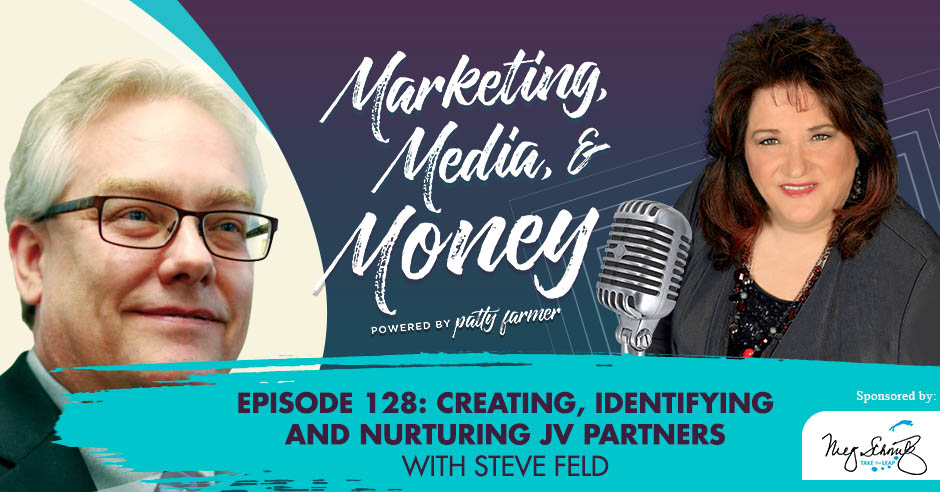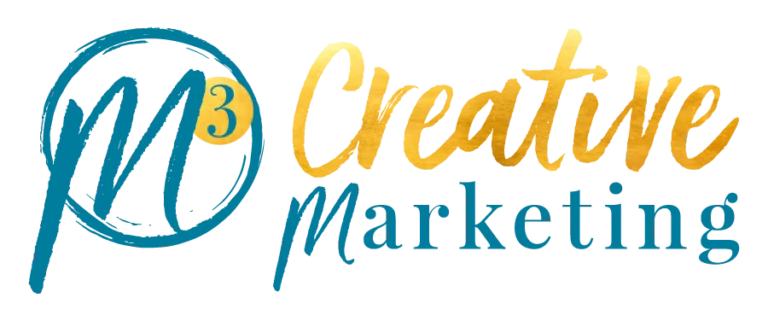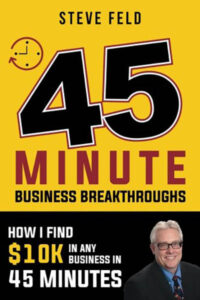
Click on the icon to listen to this episode on your favorite podcast platform.
Steve’s Free Gift: 45-Minute Business Breakthroughs
Steve’s #1 Marketing, Media & Money Strategy
DID YOU LIKE THIS EPISODE? PLEASE GIVE IT A RATING AND REVIEW
About Steve Feld
 Biz Coach Steve Feld, MBA, is a Certified Business Coach, Author, Podcast Host, Professional Speaker, Coffee Enthusiast, and award winning Business Management Executive. Over 500 businesses have sought out his services to work with them on gaining much needed clarity, implementing solid strategic plans, and achieving positive growth results. Steve is passionate about business growth, efficient operations, and long-term success. He has built, owned, and operated 7 lucrative businesses. He has consulted with other businesses providing change management and process improvement. He operated within 3 Fortune 500 companies, manning and boosting an entire division for them. Today, businesses hire Biz Coach Steve to skyrocket their revenue and profits. With an array of resources from 1 on 1 and group coaching to mastermind facilitation and an E-Learning Academy and proprietary software, Steve has all the proven tools and resources businesses need to expand. Biz Coach Steve provides workshops, training, and business performance coaching to business owners, professionals, and executives in any business stage. Steve has also written 7 books.
Biz Coach Steve Feld, MBA, is a Certified Business Coach, Author, Podcast Host, Professional Speaker, Coffee Enthusiast, and award winning Business Management Executive. Over 500 businesses have sought out his services to work with them on gaining much needed clarity, implementing solid strategic plans, and achieving positive growth results. Steve is passionate about business growth, efficient operations, and long-term success. He has built, owned, and operated 7 lucrative businesses. He has consulted with other businesses providing change management and process improvement. He operated within 3 Fortune 500 companies, manning and boosting an entire division for them. Today, businesses hire Biz Coach Steve to skyrocket their revenue and profits. With an array of resources from 1 on 1 and group coaching to mastermind facilitation and an E-Learning Academy and proprietary software, Steve has all the proven tools and resources businesses need to expand. Biz Coach Steve provides workshops, training, and business performance coaching to business owners, professionals, and executives in any business stage. Steve has also written 7 books.Resources and Important Links
Grab Your Free Marketing, Media, & Money Assessment
Meet Our Sponsor
The Marketing, Media, & Money Podcast (and magazine) would like to thank our sponsor Meg Schmitz, founder of Take the Leap franchise consulting company.
The franchise industry is booming as people look to diversify their income streams with essential businesses, without having to quit their day job. If you have ever considered what it would be like to own your own business with the security of a solid brand behind you, schedule a call with Meg. The conversation is free, and the insights are priceless. https://MegSchmitz.com
Creating, Identifying And Nurturing JV Partners With Steve Feld
Welcome to this episode of the show. I'm looking forward to sharing this industry expertise with you. We are going to be talking about focusing on creating joint venture partners to grow your business without spending more money on marketing or advertising. Could that be true? Absolutely. Our guest is going to share about it and what some strategies would be for you to implement. Get your pen and paper out. Get ready to take some notes and learn some nuggets.
Let me tell you a little bit about our guest. Biz Coach Steve Feld is a certified business coach, author, professional speaker, podcast host, and award-winning business management executive. His goal is to stop business owners from suffering entrepreneurial depression and to stop making running their businesses so difficult. He has owned and operated seven businesses, turned around three others, and written seven books. Business owners and entrepreneurs hire him to crack seven figures without burning themselves out. Please welcome Biz Coach Steve. Thanks so much for being here with me, Steve.
Thanks for having me.
Let's dive right in. I have to tell you what we are going to talk about. Joint ventures are something that's near and dear to my heart. To get us started first, for those in the audience who may not know, what is your definition of a joint venture?
The way I teach it for my business owners and everywhere I talk is by partnering up with someone who also services the same tribe as you. By tribe, I mean your target market. You could do things differently than they do. We are going to get deep into it. I partner up with a lot of other coaches and consultants. They do things that I don't do and I do things that they don't do, but we both serve the same people. Why not come together, introduce one another to each other's tribes, expand our networks, and help the people out? At the end of the day, it's all about helping your customer.

JV Partners: Joint venturing is partnering up with someone who also services the same tribe as you. You want to partner up with people who are good at your weaknesses. You both serve the same people, so why not just expand?
That is so true. A lot of times, people don't get that. In the world of coaching, marketing, and all of those things, it's a huge umbrella. If you know how you serve, the best partner's always going to be somebody who serves the same market as you but in a completely different way. A lot of times, people tend to want to focus on their strengths or the things they do well, which is fabulous. I feel like the real opportunity is in the things that maybe you don't do as well.
For example, I don't love to copy write. That is not one of my skillsets. It's not my favorite thing. Whenever I'm doing a joint venture, they are the very first partner I look for because that is their strength. Usually, marketing may or may not be their strength, so they are a great partner for me. People need to think outside the box a little bit and not be thinking about what their strengths are, but maybe spend some time thinking about what they are not.
Opportunity in itself, I like to call that an OPP. That stands for Other People's People. That is the name of the game. For the audience out there, that's what we are going to be talking about in this episode. Here's my first question. Do you think there is a difference? If you do, what do you think the difference is between a joint venture and collaborating with somebody?
I will tackle collaboration. People collaborate all the time. They are like, “Let's get together for coffee and talk about some things.” That's a collaboration. Did any action come out of it? You can maybe do what I say a joint venture is, which is, “Let's get together. I will promote you. You promote me on your platform. We are going to share our audiences.” There could be affiliate fees involved, like income. If I get clients from you, then why not pay you for that and vice versa?
We have a proactive strategy to promote each other. I have collaborated with businesses before. We have done a webinar together. It’s like, “You invite your people and I will invite my people. Let's see what happens.” Did we have any joint ventureship created where we were actively promoting the other person, and we didn't? That was a collaboration. We had a great webinar. We had a couple of hundred people on it. They did part of it. I did part of it. We went back and forth. Whatever business we got of it was our own. We didn't track if it came from which one.
Would you say that sometimes, when we are collaborating, that could be that we are sharing tasks? We are sharing tasks, not necessarily creating a revenue strategy. With revenue sharing, as a speaker, this is something that happens all the time. Especially if you are a platform speaker or a self-on-the-stage speaker, this is something that people will come across a lot. It doesn't have to be left on the stage. There are a lot of opportunities there.
Thinking about what I said, you could sit there and write this whole list of what your strengths are. It's also important to write a list of some of those things or maybe some industries that serve the same market as you but in a completely different way. As a marketing person, the marketing umbrella is very big. People who do websites fall under the marketing umbrella. I don't do websites at all, so they are a great referral partner for me. I don't do branding either. I can do branding. It's not that I don't know it, but I like to stay in my lane in marketing and media. I find that they make great referral partners.
If you are not an abundance mindset person and maybe a little bit more of a scarcity mindset, and hopefully, Steve's going to help you to shift that, one of the things is when you tell people that you can do this, even if the one in the middle is the thing that you are the authority and you can do some of those things, the question you need to ask yourself is should you? Are you leaving revenue on the table by not having a partner come in and doing a joint venture together versus doing everything yourself?
A lot of times, people who maybe don't have quite the abundance mentality don't want to refer you business because you are doing a little bit of what they do. They don't feel comfortable when you are overlapping. I'm sure you are going to agree with me here. For me, the people that overlap with me are my best joint venture partners, for sure. Where do you stand on that?
I will even take that example. I had a client. I was working on his business. He had an HR problem. We started looking at going through the business. He had no HR personnel. He had no employee handbook with 84 employees. It was a mess. Could I do it? Yes. Do I want to do it? No. Am I the expert on it? No. I know someone who has their own HR company and does exactly this.
I called them up and I brought them in as my strategic alliance partner. I introduced them to the owner. I said, “This person is the person who will focus on this and clean it up.” He's like, “Let's do it.” She then paid me a referral fee from it. In that way, I have the expert taking care of it and I'm getting paid by referring it out. The client is happier than anything because someone who lives, dies, and breathes HR is doing it, not me.
It makes a lot of sense. When you realize that, too, maybe you are not making as much money, but you didn't have to do any of the work. The time that was involved in that is key. That's what people need to think about. Setting yourself up in your tribe, network, or whatever you want to call it for yourself being that go-to expert is the most important thing.
In my network, that is me. People know that it doesn't matter whether they are talking about marketing or not. They can go out and find somebody or tell me, “I can come to you and say, ‘Who do you know that does this? Who do you know that does that?’” They know that not only am I going to be able to tell them who, but I will be able to do a personal introduction and I have already vetted them. I would never refer somebody as a partner that I hadn't vetted first. The reality is there's value in that.
I even have a sheet. It has my referral who I would refer up because they have already been vetted. I trust them. I have seen their work. I know their clients, and they do the same for me. When someone says, “I need to get my website redone,” I’m like, “That’s great. I know three companies, but let's get deeper.” I know the questions to ask to find which one of those three is the best one for them.
After I do that, I call up the company. I say, “I got a client. Here's what they are looking for.” We are collaborating. We stay on the same page with the client. The client doesn't know that we are always talking in the back to make sure we are doing the best possible work for the client. He's getting what they want out of it, which is a website. We are both moving ahead, and the client is happy as can be. Meanwhile, it's the referral fee, strategic alliance, or whatever you want to call it, but I know these people are going to do a kick-butt job on it.
That's what I call a win.
A lot of business owners I come across are like, “I would never give away that business. I could develop it.” I'm like, “You can't. These are the people who are experts in it.” Do you think if you give away a little piece of information, your client's going to leave you? No. Become the resource center for your client. That's going to help them in the long run.

JV Partners: Become the resource center for your client because that's going to help them in the long run. Giving off little bits of information to your client is not going to make them leave you.
Not only that, but let's say this is your area of expertise. I will use myself, marketing, and media. I can do branding. You are going to do usually your branding before you do the marketing strategy. If branding is not the absolute top-dog thing that I can do but I want to do it because I don't want to refer it out, then what's going to happen is they are going to judge how I am at marketing by how I did at the branding. You are leaving money on the table.
They are going to think a lot of you if you could say, “I can do the branding for you. That is part of marketing. However, to serve you, I would like to bring in somebody who's an absolute expert. That's what they do. How do you feel about that?” They love that. They know that you now care about them and that you are willing to lose some money that would go to somebody else because you are thinking of their best interests. That is the bigger win. Plus, it's the win with the relationship that you built with the branding person, too, in this example.
I even had a client. We talked about copywriters. When I looked at their website, it was a copy write nightmare. That is one of my weaknesses as well. I have copywriters on speed dial. This person was like, “Your wording doesn't match up with anything else.” I go, “Let me bring in one of my team members.” I called up one of the copywriters I know who specializes in websites. That's their jam. I said, “You are coming in as my team. How much? We will tack it on to the client and then I will pay you out.” He was happy as can be. The client thought, “Your team member is so nice to work with.” I vetted him. I trust him. It was seamless. There are many ways to set this up. It's what's in the best interest of your client.
Here is what I'd like to do. In your book, when you talk about this, I love that you give this overview of the florist. Stepping away from your business and my business and what we do for the audience so this doesn't look like we are doing a shameless self-promotion episode, let’s take it out and go to that overview that you shared. I thought it hit all the points well. You could do an overview of that, then we will come back and dive into the specifics of how to break it down. How does that sound?
That’s excellent. I was talking about using a florist as an example to build joint venture partners. What we have to create is what's called an event chain. It's all the people. Think of who your client is. The florist is thinking about who comes to them. We are going to take one of their many aspects because they service a lot of different things. We are going to pick weddings. Florists love weddings. Weddings love florists, or at least the bride or the groom does. We got to think, “Who is getting married? What are they looking for before they get to the florist?”
Look at your downstream partners. Wouldn't they already have a venue by then? Wouldn't they have their dress their date, the reception, the DJ, and even the ring by then? The jeweler is the very first person in the event chain because, without the ring, it doesn't set off the event chain. Someone has to propose to somebody, and that is usually with a ring. Once the ring goes on the finger, then whoever the bride or groom is, is thinking of dates. They need a reception hall or a venue. That's probably the next one in the event chain. It is a venue. You got to get that booked. Probably right after that, they need a wedding dress.
For each and every business, what we have to do is sit down with them individually. What we do is get it out of your head. Who comes before you? You also have to think about who comes after you. After the florist, then it might be, “I need a limo, honeymoon, vacation planner, and those kinds of things.” That's after the florist. Think about it. Anyone who has a wedding does it in a sequence. It's pretty much the same for the whole industry.

JV Partners: Sit down with your team and ask them who comes before and after you in the event chain. Look at your downstream partners and get ready to joint venture with them.
I have been to so many bridal shows. It's insane. Guess what this event chain holds? I have talked to many florists. They go, “Do you know who the bride and groom go after they get their flowers? They always go and get a cake. They are always after us.” Why not go to the people before you and create a joint venture partner, let’s say, with the reception hall?
The bride and groom are talking in the reception hall and they are thinking about a million things in the reception hall. The reception hall is like, “Have you thought about flowers?” They are like, “That’s going to be later on.” The reception hall is then like, “You got to see Flora the florist.” They are like, “That’s great.” The reception hall referred them to me. I would be happy to pay a 10%, 15%, or 20% referral fee to the reception hall because that's business I didn't get. That person could have gone to any florist.
You can set up a joint venture partner with everyone referring business to you before they get to you, your downstream partners, and then the bakers after you. Why not set up joint venture partners for everyone who is after me? They come to the store. I get them set up with flowers and I’m like, “Have you gotten a cake yet?” They are like, “No.” I’m like, “I know someone who makes cakes. It’s perfect for you.” I refer him to the baker and the baker gives me a referral fee. You can turn this into a great stream of revenue. Guess what this cost you. Zero. You have to put some time into it and you have to approach the partners in a certain way. You have to vet your partner.
A lot of times, people don't always see it. I always like to say, “When you are doing a joint venture or even when you are collaborating, you have to understand that you have been thinking about it.” You already have the chain of events all set. When you go and talk to that person, they are hearing about it. They can't process it that fast. You have to spell it out for them. Like anything else, when you are spelling it out for somebody, you have to look through the lens of what's in it for them because that's what they are looking at. It is what's in it for them. Get to the point. Don't bury the lead. Tell them what's in it for them, and then you can work your way backward. I do love that.
The reason why I wanted you to share the overview with the florist is that I want to bring it back and think about who is my audience. For those of you that are out in my audience, start thinking about it. Who are the upstream and downstream people for you? Make that list and start thinking about them. Pick 1 or 2 because Steve's going to take us a little bit through the process. My first question is how do you create a JV?
Once you have your list, you have to know your target market and how you serve them. I find a lot of business owners are very flaky about that. If you are not clear on this, how can you go to a joint venture partner and be clear? They are going to say, “You are out of here.” Once you have your list, it's how to approach them and make it what's in it for them. It’s like what you mentioned. I couldn't agree more with you on that. It’s to set up a couple of them.
If you are that florist, what about three wedding bridal gowns and groomsmen locations that they are referring business to you? That's three. That’s great. Could you refer the business to them? Yeah. You have to have a strategic plan to go after them. I always say to start where you are at. You are probably in the middle. Think of a line, and you are dead in the middle. You look at your downstream on your left. Start with who is closer before you and who sends business to you first. Start with them, then work your way down to the left or down in line and do the same thing with upline for your upstream partners. In that way, you are going to slowly build it out.
What we are talking about is identifying JV partners. We are talking about a revenue multiplier. This is a revenue multiplier. When you are thinking about it, if you identify your upstream and downstream, you got to remember that even once you do that, you get to duplicate that over and over. There's more than one florist, more than one caterer, more than one person who's selling that wedding dress, and more than one person who's going to create that wedding cake.
Once you identify this is truly a wash, rinse, and repeat, which is always wonderful because I love things that once you create, you can do them over and over again. When you are thinking about the visual of the line that you are talking about where you are in the middle and then you have the people to the right and to the left for your upstream and downstream, you could draw it out on the document. You could change the names, faces, and industries for the different partners and the different people who serve your audience.
Once you do it, what you are saying is, “That's for somebody who does branding.” You are like, “Here's somebody who does websites.” What does that look like? You are like, “I know five people who do websites. I could do that five different times.” The reality is you almost could create revenue that will keep multiplying that revenue. You haven't even worked on your clients yet. You are still in this partnership thing and doing that. That is identifying the multiple joint venture partners. I also believe that you have to have some type of nurture sequence going on as well. Talk to us a little bit about how you nurture those relationships and expand on them as well.
The biggest thing is staying in touch. We talked about a florist. It's a physical, tangible good. It can also be done in the service business. Sometimes, your downstream or upstream partners could also be the same ones. How are you going to nurture this? Let's say one of my great referral partners is CPAs. CPAs send business owners to me to help work on their businesses. I work on their business. I have created a new problem for that client. You are thinking, “I created a problem. I got more income. They have more employees. They need more accounting needs.” I have to refer them back to their CPA. Maybe they are too big for their CPA or it's changed, so I have to refer them to another CPA.
That's important to know because I feel that. I tell this to my clients all the time. Every time you solve a problem, it illuminates another problem. That's how business is. You decide, “I have got this branding. I love my brand now. That's great. How am I going to market that brand?” You go to the marketing person. Maybe while you are with the marketing person, you realize, “I need to rebrand my website because I have this great new brand. I have these amazing marketing strategies now, but it's not reflected on my website. I need to have a new website.” The website person's going to say they need to have the copy for the website, so I need to talk to the copy person. Honestly, every problem solved illuminates another problem. That is a good thing.
I talk to my referral partners on a regular basis. I send them notes, even handwritten thank you notes, for being a partner. I also re-evaluate my partnerships usually every year, more like every six months. Some partnerships will fade and some will flourish. It's like in business. We all have clients that are rockstar clients and then we have clients who drain the life out of us. You got to be moving and evolving because your business is going to be moving and evolving as well. You got to make sure your partners are moving and evolving with you.
Using the florist, let’s say that the reception hall during the pandemic went bankrupt. They are gone. You need to fill that gap all the time. You are always looking for more partners. It doesn't cost you anything to do this, but it can bring you in so much extra revenue it's worth it. You always have to be nurturing the relationship. I did this with landscaping. They created a landing page and a brochure. It’s everything you need to know about landscaping your home. It had ten simple tips in It. He had a website. He marketed it, but people opted in to get this list. Guess what he did with the list? He then went to his downstream and upstream partners and said, “I have a lead for you.” He became the source of the leads.
As long as they were following the CAN-SPAM law, that works in how they were doing it. How would it work? When you are thinking about it, you have JV partners and you may have products and services. In my world anyway, it doesn't always mean that you have to do a referral. Sometimes, you can, and sometimes, you can't. Sometimes, you can endorse something. You can endorse something for somebody. If you have taken their program, maybe you would have them be in this stream for you. I know this is where joint ventures touch also going into a form of affiliate marketing. Sometimes, it is endorsing.
I will give you a perfect example. If people come on my show and say, “I would love to come on your show and talk about my book. My book is launching. It's going to launch right now. I have this. It's important to me. I would love to come on your show and talk about it.” I will do my due diligence to make sure they serve my audience. I will tell them, “If you wanted me to interview you on my show, I will do that and we can talk about your book. If you want me to endorse your book, which is different, you need to send me a copy of your book because I'm not going to endorse something I haven't read.” There's a little bit of a difference there. I'm never going to tell somebody that I believe in this thing or that thing if I don't know.
It’s making sure that you always stay with integrity 100%. People will trust you. That's part of the know, like, and trust. It's part of the go-to expert authority that you are because they know that you have that. That's part of that vetting process. I feel like that goes in there, too. How are you finding in this joint venture stream that you are talking about here endorsing versus referring versus introducing? They are all separate things. Sometimes, an introduction is the best. It's the gift that keeps on giving. Where do you see for you how those three things interact?
I have referred people. I've developed a great joint ventureship with Liam Austin and his team. We were talking and I go, “Who else are you looking for? What other kinds of programs does Liam have coming up?” They said, “This.” I go, “I know a great referral partner for you. It’s a good joint venture.” I referred them and connected them together. That was easy. How does it help me? If it helps them, they are going to help me. I promoted Liam many times before I got on their radar for them to start promoting my products and services.
Another great way is I did this with someone. Our tribes were aligned but not fully in the same bubble, if you will. They got two circles on top of each other. It was a little off-centered. They did cross over a little bit. We said, “We can't have a good joint ventureship program, but let's do something different.” They were like, “We are new to this whole joint venture world.” I said, “Why don't we do an email swap?”
What it is, I will say, “What do you have coming up?” You can say, “I got this workshop.” I’m like, “That’s great. Let me send an email to my tribe and put it in my newsletter that you have that email. Whatever you get out of it, good for you. I’m happy.” You might say, “What do you have coming up?” I’d be like, “I got a masterclass.” You are like, “That’s great. I will send out an email and put it in my newsletter. Good luck.” We help each other out, but there's no formal agreement. There's no money exchange. There’s nothing. We are popping up on each other's radars and promoting each other to our tribe.
This is a good way for people to see how you can expand on your own area of expertise and how you can truly serve your market better. You can become that go-to person and beat out your competition if you believe in competition. You beat out your competition because you bring more to the table. This is about your equity. This is your social equity. This is how you have a network that people want to be able to tap into.
I used to say that people who hire me know they get access to my Rolodex. The reality is that is what it is. It's like the old cell phone commercial where they used to say, “Here you are.” It's not just me. It's all of the people behind me. It's probably never been truer than this. We care about our time, our energy, resources, and money. It’s being able to have a whole network of people that don't serve you but serve the people that you serve.
I don't want to stray too much, but a lot of times, when people are networking, they are like, “We don't serve the same people.” They don't see the value. That's small thinking. You got to be thinking about it. I listen to whether they serve the people in my audience. This is a good opportunity for me to be able to step in and serve.
What I'm hoping is that the people that are listening, if nothing else, I hope you are expanding your vision for possibilities. You are like, “What could be possible now?” Look at all these ways that we talked about generating revenue. Nowhere in there have we had a conversation about our clients other than that we serve them in similar ways. We didn't talk about, “This is how I hire my clients.” What we are talking about is how we serve them and who they serve, which is an even bigger picture. Where relationships are the currency in this business environment is the name of the game. I always like to say when you are thinking about it, your business is like an ATM machine. Are you making more deposits or more withdrawals? This is a way for you to be able to make deposits.
I have to tell you. This concept is brilliant. I love it. It takes joint venturing to the very next level, which I love. I love that you were able to fine-tune it. I have been doing it for a long time, but I have never seen it written out in the way that you break it down. I love that it's right. No marketing and no advertising is the name of the game.
For the audience, this is one strategy in the book that he's going to share. 1 strategy out of 8 is what we are talking about. You are going to want to make sure that you grab his book. Before we go there, how do you want people to connect with you? I know they are going to want to connect with you. What is the best way for them to do that?
I'm on social media platforms, primarily LinkedIn and Facebook. You could also check me out on my website at BizCoachSteve.com.
That’s perfect. You came bearing gifts. We talked about your book, so that's great. You came bearing gifts. How often does somebody give it to you for free? Tell us a little bit about that gift. That is amazing that you are willing to give somebody your whole book.
My passion is seeing small business owners survive, thrive, and build long-term sustainable businesses. I got to serve that, and I'm very happy about it. The book is 45-Minute Business Breakthroughs. It outlines eight simple strategies that you can implement in your business. We talked about joint ventures as one of them. It's usually the most popular. Put it in your business without spending more on marketing or advertising. You could download that at BizCoachSteve.com/100K.
That is awesome. As we are beginning to wind down, what would you say your number one marketing, media, and money strategy would be?
It’s something I learned the hard way. Stop doing everything yourself and get some help. Focus more on your strategy than the tactics when you are implementing your marketing.
That is a great strategy. You have given a different slant to it. What most people think about not doing everything yourself and getting help is they are thinking about outsourcing or hiring a VA. This here is a lot more revenue-generating with what you have shared. I love that tip. Thank you so much. Thank you for being here on the show with me. I appreciate you sharing your brilliance so generously.
Thank you for having me.
To my audience, thank you so much for being here, being consistent, and showing up every single week to read about our guests and what we share with you. I appreciate you so much. While we are talking about appreciation, I have to say that I appreciate our sponsor as well. The show and magazine are sponsored by Meg Schmitz, the Founder of Take the Leap Franchise Consulting Company. The franchise industry is booming as people look to diversify their income streams with essential businesses without having to quit their day job.
To learn more and to schedule a call, go to MegSchmitz.com. The conversation is free, but the insights are priceless. She is amazing. I can wholeheartedly endorse her. Thank you so much, Steve. Thank you to the audience. Have a great week. I hope everything is phenomenal for you. We will see you in the next episode. Thank you so much.

